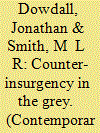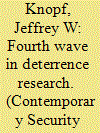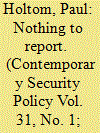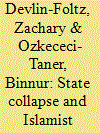|
|
|
Sort Order |
|
|
|
Items / Page
|
|
|
|
|
|
|
| Srl | Item |
| 1 |
ID:
095497


|
|
|
|
|
| Publication |
2010.
|
| Summary/Abstract |
This article focuses on a fourfold distinction among international relations approaches to security and peace (offensive realism, defensive realism, defensive liberalism and offensive liberalism), which is applied to understand differing regional dynamics of conflict resolution, particularly in two key regions: Europe and the Middle East. The shift from realist to liberal assumptions, it is argued here, is the foundation for conflict resolution. The combined effect of the realist mechanisms produced 'cold peace' in Europe, while the liberal strategies warmed the peace considerably, eventually producing a 'high-level warm peace'. More specifically, it was overlooked offensive liberal mechanisms which made an especially major contribution to the emergence of warm peace on the continent through the successful imposition of democratization on the key state for European security, Germany. Defensive liberal strategies then played a very useful supportive role in warming the regional peace. In the Middle East, in contrast, some of the conditions for the application of the realist approaches emerged after the 1973 war, and even then only in the Israeli-Egyptian context, and somewhat more broadly after the end of the Cold War and the 1991 Gulf War. But the conditions for liberal strategies are still missing even though a defensive liberal strategy has been tried in the l990s and an offensive liberal strategy was applied since 2003. Thus, only a cold peace could emerge, and even that only partially due to the relative weakness of the realist mechanisms in the Middle East in comparison to the Western European case during the Cold War.
|
|
|
|
|
|
|
|
|
|
|
|
|
|
|
|
| 2 |
ID:
095491


|
|
|
|
|
| Publication |
2010.
|
| Summary/Abstract |
This study examines contemporary counter-insurgency (COIN) warfare in terms of military ethics. The intention is to reflect upon the changing face of COIN conduct in the light of serious ethical challenges resulting from modern trends affecting combatant status, and the deployment of military force in a multipurpose framework. It shall engage with what many commentators have termed the 'grey area' of the Just War tradition: the ambiguous and challenging interim zone that lies in between the more clearly defined forms of COIN conduct. The resultant analysis shall suggest the need for a more nuanced form of ethical conduct, orientated around restraint, more flexible discriminatory principles and a proportionality framework closer to domestic policing than formal warfare. In particular, this analysis suggests that by hybridizing the military imperative with the policing model of the continuum of force a more effective, less vague and more ethically coherent construct can be produced. By embracing these concepts, military practitioners may overcome ambiguous and unhelpful moral guidance and tailor their conduct more closely to the challenges of the contemporary COIN environment. Such actions will assure they act as justly as possible in the face of 'grey area' ethics.
|
|
|
|
|
|
|
|
|
|
|
|
|
|
|
|
| 3 |
ID:
095490


|
|
|
|
|
| Publication |
2010.
|
| Summary/Abstract |
Following the end of the Cold War and accelerating after 9/11, a new wave of research on deterrence has emerged. Building on an earlier characterization by Robert Jervis, this work is here designated the fourth wave. The fourth wave reflects efforts to grapple with the change from a relatively symmetrical situation of mutual deterrence that characterized the Cold War to the asymmetric threats that dominate the current security environment for the United States and many other states. Despite widespread doubts that have been expressed in public about whether the most threatening actors today are deterrable, the fourth wave is nearly unanimous in finding that deterrence remains relevant, even with respect to terrorism. Beyond this basic consensus, the fourth wave also includes vigorous debates, particularly regarding alternative strategies for dealing with WMD-seeking rogue states. Because few analysts expect deterrence to be foolproof, especially in dealing with non-state actors, much of the work has focused on finding ways to improve the prospects for deterrence at the margins. Overall, the most important result of the fourth wave has been to reveal the value of moving toward a broader concept of deterrence that incorporates non-nuclear and even non-military sources of leverage. Proposals to use information and discourse as bases for deterrence are especially innovative and worthy of further research.
|
|
|
|
|
|
|
|
|
|
|
|
|
|
|
|
| 4 |
ID:
095493


|
|
|
|
|
| Publication |
2010.
|
| Summary/Abstract |
This essay examines recent developments in UN Register of Conventional Arms and their implications for the norm of transparency in international arms transfers. It focuses in particular upon data made available in national reports to the Register for years 2005-2008 and the outcome of the 2009 meetings of the UN Group of Governmental Experts (GGE) on the 'continuing operation of the United Nations Register of Conventional Arms and its further development'. The paper notes that the norm of transparency in international arms transfers is not under serious threat despite the decline in reporting to the Register. It also suggests that despite some positive developments in 2003 and 2006 with regard to the prospects of expanding the Register's scope, and in the process increasing its relevance, the 2009 GGE was unable to recommend the creation of a new category in the Register for reporting international transfers of small arms and light weapons.
|
|
|
|
|
|
|
|
|
|
|
|
|
|
|
|
| 5 |
ID:
095498


|
|
|
|
|
| Publication |
2010.
|
| Summary/Abstract |
Realists have been all but silent on the issue of nuclear disarmament, largely because giving up military capabilities seems counter-intuitive to realism's logic. The nonproliferation literature, on the other hand, has treated the insights of realist theory as failing to come to grips with the complex nature of a state's decision-making processes. The non-proliferation literature has produced rich empirical details of nuclear rollback; however, much of this literature lacks a general theoretical framework to provide generalizable explanations and predictions. This article advances two defensive realist hypotheses on state behaviour to explain nuclear rollback. It argues that states may voluntarily reduce their own capabilities in order to survive in an anarchic order when, in the absence of a secure second-strike capability, they make the rational decision to give up their nuclear arsenals. However, the absence of a secure second-strike capability is a necessary but not sufficient condition for nuclear disarmament. The absence of a dyadic existential threat is also a necessary condition for a state to give up its nuclear weapons. Together these two conditions, from a defensive realist perspective, are jointly necessary and sufficient for nuclear disarmament. The findings suggest that incentives for disarmament, from a realist perspective, can be made by taking into account the strategic interaction that states find themselves in vis-a-vis their environment and capabilities.
|
|
|
|
|
|
|
|
|
|
|
|
|
|
|
|
| 6 |
ID:
095494


|
|
|
|
|
| Publication |
2010.
|
| Summary/Abstract |
When states collapse, so do the most obvious obstacles to violent extremism in their territory. Extremists seem free to recruit and operate from these areas without interference from state security forces. In reality, however, state collapse creates as many constraints as opportunities for extremists. This paper problematizes the commonly held view that there is a strong link between state collapse and the rise of extremism, in particular Al Qaeda-linked extremism, that creates security threats worldwide. By comparing the Union of Islamic Courts (UIC) in Somalia and Al Qaeda in Iraq in Iraq, the paper discusses the implications of state collapse for Islamist extremism. Our empirical analysis suggests that although there is a correlation between state collapse and an increase in Islamists' appeal and influence, state collapse does not necessarily generate more violent ideologies. Rather, state collapse allows those committed to violence under all circumstances to ally more moderate elements. If the population comes to see the Islamists as destabilizing rather than securing, they may turn on them, leading the moderate Islamists to either break with the extremists, or follow them to the political margins. Similarly, extremists may grow weary of moderate actions, demanding that the group increase its violence and, again, forcing moderates to choose between the extremists' vision and broad political support. Therefore, our main finding is that contrary to the commonly held view, the population of a collapsed state, rather than an extremists' hotbed, can, in fact, be a potentially powerful anti-extremist force.
|
|
|
|
|
|
|
|
|
|
|
|
|
|
|
|
| 7 |
ID:
095496


|
|
|
|
|
| Publication |
2010.
|
| Summary/Abstract |
This article discusses the difficulties associated with military-led stability and nationbuilding operations and argues that the United States' current policy negatively affects defence capabilities, unduly influences how stability operations are prioritized and conducted, limits State Department capacities, and allows the military to be seen as the 'face' of American foreign policy. Several options exist for the United States to adequately address this issue to include the working within the established system, a reassignment of leadership responsibilities, or restraining the American tendency to intervene. The United States' military has proven that it is capable of conducting nation-building operations, but at the cost of global misperception, painful inefficiency, significant risks to United States' overall defence capabilities, and the issues of civilian control that follow from reliance on warriors in the role of diplomats.
|
|
|
|
|
|
|
|
|
|
|
|
|
|
|
|
|
|
|
|
|